Want Top Rankings? Discover How AI Makes Keyword Research 10x Easier!
Okay, real talk: if you’re in the SEO game and you’re still not using AI for keyword research, what are you even doing with your life?
It’s like trying to make a sandwich without bread. It’s just not gonna work! And look, I get it—AI sounds like some futuristic wizardry that’s only for big tech companies, but that’s simply not the case anymore.
Let me walk you through how AI is changing the keyword research game, saving time, making processes more accurate, and taking your SEO strategy to the next level.
This isn’t some fluff piece about flashy tools. We’re talking real-world applications of AI in keyword research.
Key Takeaways
AI for keyword research isn’t just a nice-to-have. It’s a must-have if you want to stay ahead in the SEO game.
Here’s what you should do next:
- Start using AI tools to gather keyword ideas.
- Focus on long-tail, low-competition keywords.
- Don’t forget to look at search intent.
- Use AI to spot trends and predict the next big thing!

What Are Keywords?
Keywords are the words and phrases the people enter into search engines when they need to find something on the web.
They are at the foundation of every SEO strategy.
A big bonus of searching for the right keywords is that it will help your content rank higher and bring people to your site.
In basic math, having more appropriate keywords means you have more chance of being discovered.
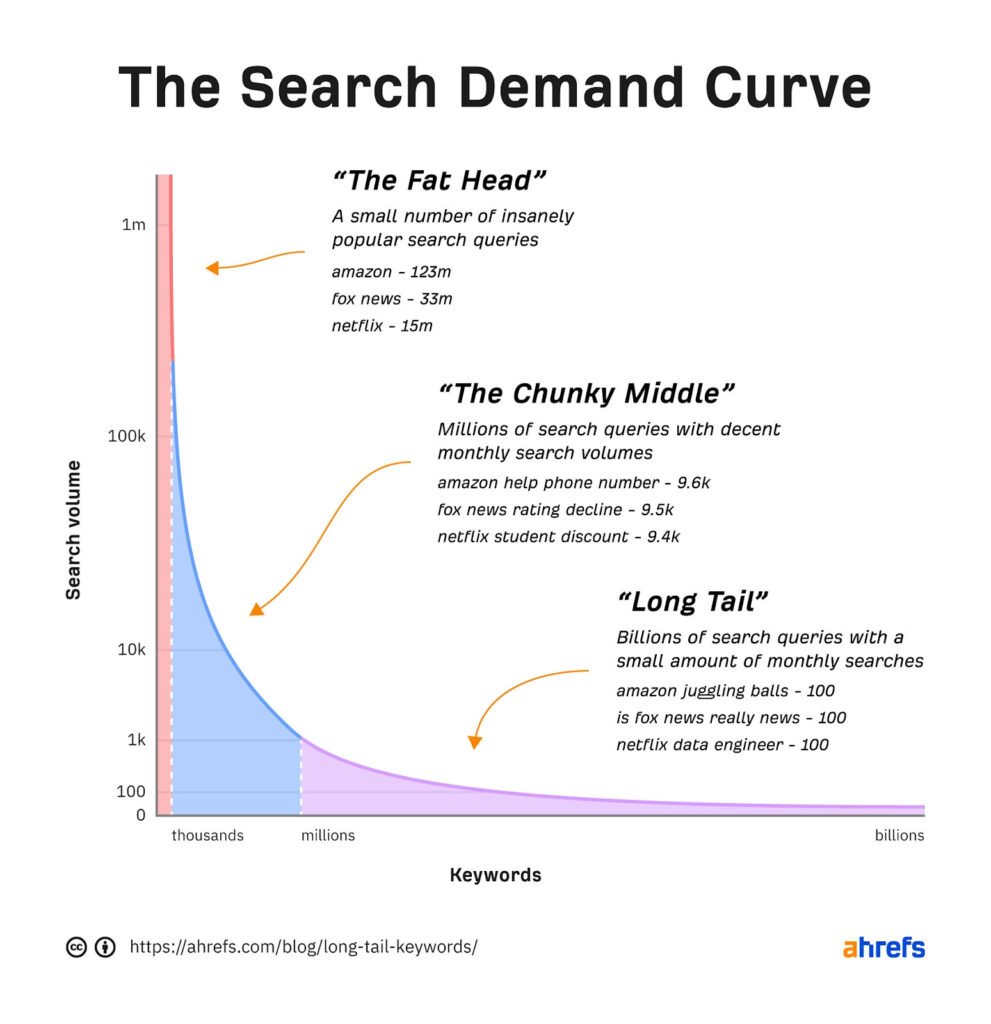
The Search Demand Curve – Short and Long Tail Keywords
Short-tail keywords are broad, highly competitive terms like “SEO” or “digital marketing” → those are super general and super competitive keywords. Those do drive lots of traffic, but they are difficult to rank for.
Long-tail keywords, on the other hand, are known to be harder types of keywords, more specific and less competitive. These could be keywords such as “SEO tips for small business.” Even if they receive less search volume, they generally convert a lot better as they speak to intent-specific users.
AI tools are perfect for searching both categories of keywords and will help you strike a balance in your strategy.
Keyword Density, Keyword Volume, And Ranking Difficulty 🔑
When you’re doing keyword research, you need to pay attention to a few important metrics:
- Keyword Density: How often a keyword appears in your content. Too much is spammy, too little is ineffective.
- Keyword Volume: How many people are searching for that term. More volume generally means more potential traffic.
- Ranking Difficulty: How tough it is to rank for that keyword. AI tools help you identify which keywords are realistic targets.
What Is Keyword Ranking, And How Is It Important?
Keyword ranking is the position of a web page or piece of content in search engine results pages (SERPs) for a specific keyword or search query.
In short, it is an indication of how well your content is doing for a specific search term when compared to all other content on the web.
That is the money quote in SEO—better rankings give you better exposure, more clicks and ultimately greater traffic to your site.
If you are number one ranking for the keyword ‘handmade jewellery‘, your web page is now at the top of the Google search for that keyword.
But being on page 10/20 means no one can see you, as hardly anyone clicks through for search results on the later pages.
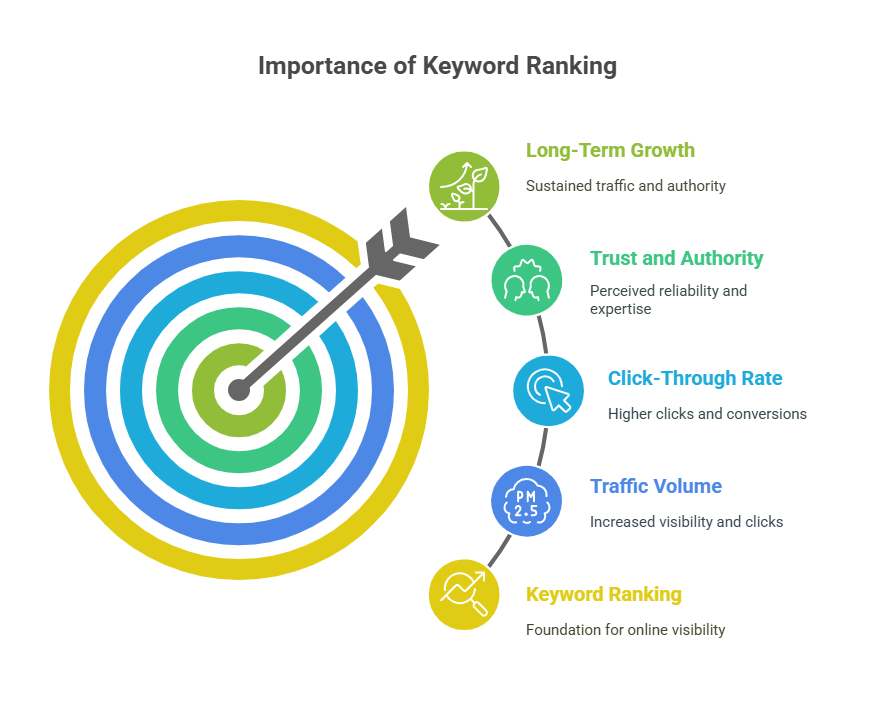
Why Is Keyword Ranking Important?
Your keyword ranking is crucial because it determines how easily potential customers can find your website through search engines.
Google, for example, has billions of searches every day.
Ranking higher for competitive keywords increases the likelihood that users will find your site first and click on your content.
This directly impacts:
- Traffic Volume: Higher rankings mean more visibility, which leads to more clicks and traffic. For high-volume keywords, this can significantly boost your site’s organic traffic.
- Click-Through Rate (CTR): Studies show that the first result on Google gets around 30% of clicks, while the second and third positions get significantly fewer. Higher rankings equal more clicks, and this leads to higher conversions.
- Trust and Authority: Websites ranking high in search results are often perceived as more trustworthy and authoritative in their field. Users trust Google’s algorithm, so being at the top implies your content is valuable and reliable.
- Long-Term Growth: Keyword rankings play a major role in building domain authority and establishing long-term organic growth. A page that maintains its high position over time will continue to drive organic traffic with minimal ongoing effort.
Why Is Artificial Intelligence A Good Starting Point For Keyword Research?
Artificial intelligence (AI) provides a powerful boost to keyword research by simplifying the process and allowing you to gather deeper, more insightful data than traditional methods.
Here’s why AI is such a fantastic starting point for SEO:
- Data Processing at Scale: Traditional keyword research often requires manually gathering data, which is time-consuming and prone to error. AI, however, can process huge datasets almost instantly, allowing you to analyze thousands (even millions) of keywords across multiple variables like volume, competition, and search intent. It helps you uncover valuable keywords that you might have missed otherwise.
- Predicting Search Trends: AI tools are designed to not just identify existing popular keywords, but also to predict which keywords are about to gain traction. For example, AI-powered tools like Frase and SurferSEO leverage historical data and user behavior to forecast emerging trends in search queries, allowing you to create content that targets keywords that are gaining momentum.
- Understanding Search Intent: AI tools can understand the context behind the keywords, identifying whether users are looking to buy something (commercial intent), learn about something (informational intent), or navigate to a specific site (navigational intent). This allows you to tailor your content more precisely to what users are really after.
- Automating Repetitive Tasks: AI eliminates the tedious tasks in keyword research. With AI, you can instantly get keyword ideas, analyze search volumes, track keyword competition, and identify related terms—all automated, saving you countless hours.
- AI-Powered Semantic Search: AI doesn’t just focus on individual keywords. Tools like ChatGPT, Claude, and Perplexity understand semantic keywords and synonyms, meaning they can suggest variations or related terms that will help your content rank for multiple search queries. This is incredibly useful for creating more comprehensive, long-tail keyword strategies.
- Improved Keyword Clustering: AI tools are also great for grouping keywords into clusters. This means you can optimize your content for entire topics, not just individual keywords. For instance, if your business sells eco-friendly products, AI can suggest keyword clusters related to sustainability, green energy, and eco-friendly solutions.
By using AI, you can make data-driven decisions based on more than just basic keyword stats. AI helps you stay ahead of the competition by adapting to search trends faster and smarter.
How To Implement Keyword Research
Implementing AI into your keyword research process isn’t complicated.
The goal is to harness the power of AI tools to automate repetitive tasks, uncover valuable insights, and optimize your SEO strategy.
Here’s a step-by-step guide to get started:
- Step 1: Choose the Right AI Tool
First, select an AI-powered keyword research tool. Popular options include Frase, SurferSEO, SEMrush, and Ahrefs. These tools offer features like keyword suggestions, competitor analysis, and even content planning. Some tools are specific to particular tasks (like generating keyword clusters), while others are all-in-one solutions. - Step 2: Identify Seed Keywords
Start by entering seed keywords related to your niche. These are broad terms that define your business. For example, if you’re in the fitness niche, your seed keywords might be “fitness tips,” “workout routines,” or “personal training.” - Step 3: Use AI to Expand Your List
Let the AI tools suggest related keywords and long-tail variations. For instance, if your seed keyword is “fitness,” AI might suggest variations like “best workout routines for weight loss” or “how to build muscle fast.” The AI also helps you find less competitive, more specific terms that you can target. - Step 4: Analyze Search Intent
Review the search intent behind the suggested keywords. AI can help you identify whether users are looking to make a purchase, read an article, or find a service. Make sure the content you create is aligned with what users want. - Step 5: Evaluate Keyword Difficulty
AI tools will provide information on keyword competition. Some keywords will be extremely competitive (e.g., “fitness tips”), while others may have low competition but high potential. Pick a mix of keywords to target both in-demand terms and less competitive, long-tail options. - Step 6: Organize Keywords into Clusters
Once you have your list of keywords, use AI tools to group related keywords together into clusters. This makes your content strategy more focused and allows you to target multiple keywords at once in a single piece of content. For example, a cluster for “fitness” could include terms like “exercise routines,” “strength training,” and “home gym equipment.” - Step 7: Create Content Around These Keywords
Based on your keyword research, start creating high-quality content that satisfies search intent and targets your chosen keywords. The more relevant and helpful your content is, the more likely it is to rank.
By following this process, you’ll be able to use AI not just to gather data but to strategically plan and execute your SEO efforts.
What Is AI for Keyword Research Anyway?
Setting the stage (Pun intended) Before we plunge head-on into the magic,… If you want your content to rank on Google then the first step is to do keyword research.
The whole point is to identify the keywords used by your potential customers when searching for products, services or content. In short, keywords connect your content to the people that need to find it.
With AI keyword research, for instance, machine learning algorithms can scan massive quantities of search data to pinpoint the most pertinent and profitable keywords specific to your business.
AI tools can analyze billions of search queries in a split of seconds, identify the trends in user behavior, and recommend the keyword possibilities for your SEO strategy.
Think about if someone were to do all of the search research for you, imagine having an assistant that could find exactly what people are looking for and the kind of information without doing it yourself.
It’s not magic—it’s AI!
Can AI Do Keyword Research?
Can AI do keyword research? That’s like asking, “Can a smartphone make a phone call?” Of course, it can!
AI isn’t just a shiny, futuristic concept; it’s already here and making an impact. The truth is, AI takes the guesswork out of keyword research.
It analyzes large sets of data, identifies trends, predicts user behavior, and gives you data-backed keyword suggestions. These suggestions are often more accurate than the traditional methods we’ve been using for years.
For example, AI-powered tools like SEMrush, Ahrefs, and Frase can scrape search volumes, competition data, related terms, and even search intent.
They make keyword research faster, more accurate, and often way more efficient than the methods we used before. Plus, AI can spot trends before they’re even on your radar.
To sum it up: AI can not only do keyword research, but it does it better, faster, and smarter.
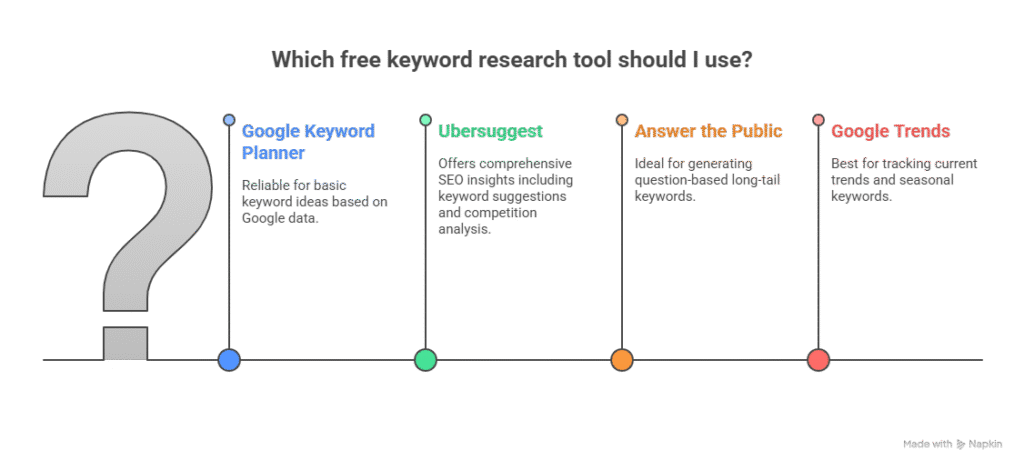
Best Free Keyword Research Tools (Yes, They Exist!)
Now, I know that not everyone has a big budget for premium tools.
Fortunately, there are free tools that give you solid insights into keyword research without making you break the bank.
Here are some of the best free tools that can get the job done:
- Google Keyword Planner: A classic. It’s free, easy to use, and reliable for finding keyword ideas based on actual Google data. While it’s a bit limited in features compared to paid tools, it’s still a solid choice.
- Ubersuggest: This tool is like the Swiss Army knife for SEO. Ubersuggest offers keyword suggestions, search volume data, competition analysis, and even content ideas, all for free. A personal favorite!
- Answer the Public: If you’re focused on questions and looking to create highly relevant blog content, Answer the Public is a treasure trove. It’s great for long-tail keyword suggestions in the form of questions, prepositions, and comparisons.
- Google Trends: Want to know what’s hot right now? Google Trends helps you track keyword volume and rising trends. It’s perfect for identifying seasonal keywords or spotting keywords that are starting to gain traction.
AI tools like Frase and SurferSEO also offer free trials, so you can experience AI-powered keyword research without committing long-term.
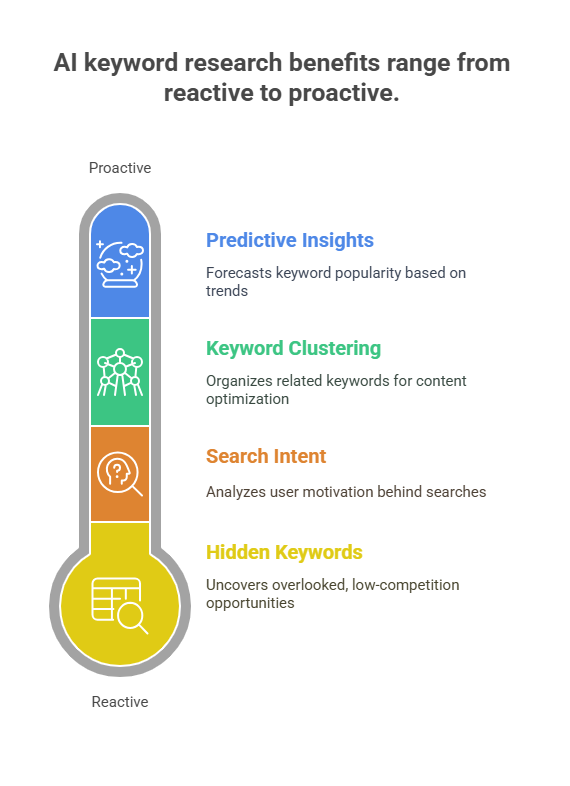
Benefits of AI Keyword Research
When it comes to AI, it’s not just about making your keyword research easier—it’s about making it better. Here’s how AI can benefit your SEO strategy:
- Discover Hidden Keywords: AI can dig deeper into search data to uncover low-competition keywords that have decent search volume. These are often the “hidden gems” that most people miss because they’re not as obvious as the top-ranking keywords.
- Better Search Intent Analysis: AI is great at understanding the intent behind the search. It doesn’t just look at the keywords, it looks at why users are searching for them. Are they looking to buy something? Or are they just looking for information? Understanding this helps you create content that speaks directly to the user’s needs.
- Keyword Clustering: AI tools group related keywords together into clusters. This helps you optimize your content for multiple keywords around the same topic. You’ll be able to rank for more keywords with less effort—this is a massive time-saver.
- Predictive Insights: Based on historical search data, AI can predict which keywords are likely to rise in popularity. This is like having an SEO crystal ball that lets you stay ahead of the curve and target emerging trends before everyone else jumps on them.
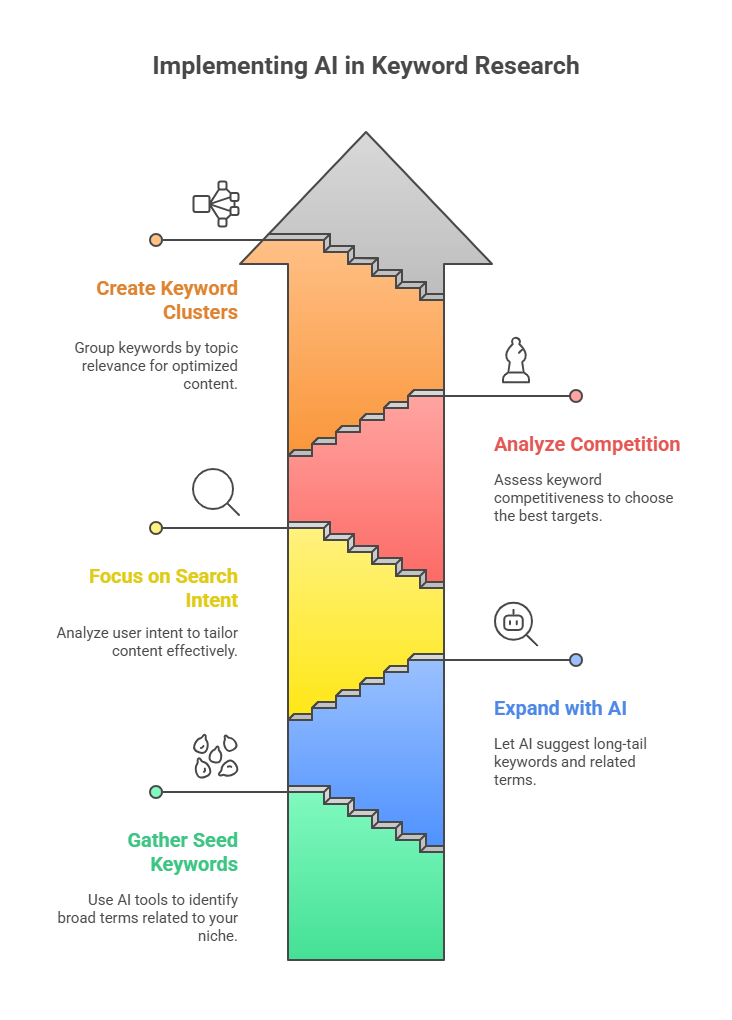
Implementing AI Into Your Keyword Research Strategy
Now that you know how AI helps with keyword research, you’re probably wondering, “How do I actually implement AI into my strategy?” Let’s break it down:
- Start with Seed Keywords: Use AI-powered tools like Ahrefs, Frase, or Ubersuggest to gather your seed keywords (broad terms related to your niche).
- Expand with AI: Once you have your seed keywords, let AI expand on them by suggesting long-tail keywords, related terms, and questions that users are searching for.
- Focus on Search Intent: AI doesn’t just give you random keywords. It analyzes search intent (informational, transactional, navigational) to ensure the keywords match what users are looking for. This means you can create content tailored to the user’s needs.
- Analyze Competition: AI can help you see how competitive certain keywords are. It’ll show you whether the keyword is worth targeting or if you’ll be fighting an uphill battle. Go for keywords with decent search volume but lower competition.
- Keyword Clusters: Group your keywords into clusters based on topic relevance. AI makes this step super easy, and it’ll help you optimize your content for multiple keywords at once.
Ways to Use AI for Keyword Research
AI can do more than just find keywords. Here’s how you can use AI to maximize your keyword research:
- Instantly Generate Keyword Ideas: AI tools can instantly provide a list of keyword ideas, saving you hours of brainstorming. No more spending days on Google looking for keyword inspiration.
- Collect Data at Scale: AI tools gather keyword data from all over the web. Whether you’re targeting a local market or a global one, AI tools will give you a bird’s-eye view of keyword performance across different regions.
- Filter Out Keywords That Are Easy to Rank: AI can filter out the difficult, high-competition keywords and suggest ones that are more achievable. You’ll spend less time fighting for page one rankings.
- Find Keywords Your Competitors Rank For: AI tools like SEMrush and Ahrefs let you see which keywords your competitors are targeting. This is great for identifying gaps in your own keyword strategy.
- Identify New and Trending Keywords: AI tools analyze real-time data to spot trends early. You can jump on those rising keywords before your competitors even realize they’re hot.
- Analyze Search Intent and Build Keyword Strategies: AI helps you target keywords based on the user’s intent. By understanding whether someone wants to make a purchase or just learn more, you can create the right content that converts.
How to Get Keyword Research Done by AI: A Step-by-Step Guide
Alright, here’s the fun part. You’re ready to take action. Here’s how to get AI to do the heavy lifting:
- Step 1: Choose Your Tool
Pick your AI tool (I personally love Ubersuggest and Frase). If you’re feeling fancy, try Ahrefs or SEMrush. - Step 2: Enter Your Seed Keywords
Start with broad keywords related to your business. If you’re in e-commerce, enter terms like “handmade jewelry” or “personalized gifts.” - Step 3: Let AI Generate Ideas
Sit back, relax, and let the AI pull in keyword suggestions. It’ll give you a whole bunch of long-tail keywords, questions, and even related terms. - Step 4: Analyze Data
Review the search volume and competition for each keyword. Focus on keywords with low to medium competition but good search volume. - Step 5: Organize Keywords into Clusters
AI tools like SurferSEO and Frase allow you to group keywords into clusters based on topics. This makes your content planning super easy.
Pro Tip: AI doesn’t just do all the hard work. It thinks about it. You’re still in control. Think of AI as a super-powered assistant who’s always one step ahead, but you’re the captain of this ship. ⛵
Common Pitfalls of AI Keyword Research (Don’t Fall for These!)
It’s not all sunshine and rainbows, folks. Here are a few things you should watch out for when doing AI keyword research:
- Ignoring Search Intent: AI gives you keyword suggestions, but it’s your job to make sure they match the searcher’s intent. For instance, “how to bake a cake” and “cake baking supplies” are different types of search intents.
- Focusing Only on Short-Tail Keywords: Short-tail keywords might get more traffic, but they’re also more competitive. Don’t ignore those valuable long-tail keywords—they might have less search volume but are often easier to rank for.
- Getting Overwhelmed by Data: AI will give you tons of keyword suggestions. Don’t try to tackle them all. Pick a few high-impact keywords that align with your business and focus on those.
By avoiding these pitfalls, you’ll get the most out of your AI-powered keyword research and build a winning strategy.
Monitoring Keyword Trends with Predictive SEO
Google says 51 percent of shoppers who research products and services use search engines to find what they need.
If you’re not ranking near the top, you’re missing out on serious opportunities.
AI can help you stay competitive by spotting shifts in trends and predicting which keywords will blow up next.
For example, you can track rising trends, adjust your keyword strategy, and stay ahead of your competition. Predictive SEO can give you that edge to ensure your content is always on point.
How to Use AI Tools Like ChatGPT, Gemini, Claude, and Perplexity for Keyword Research
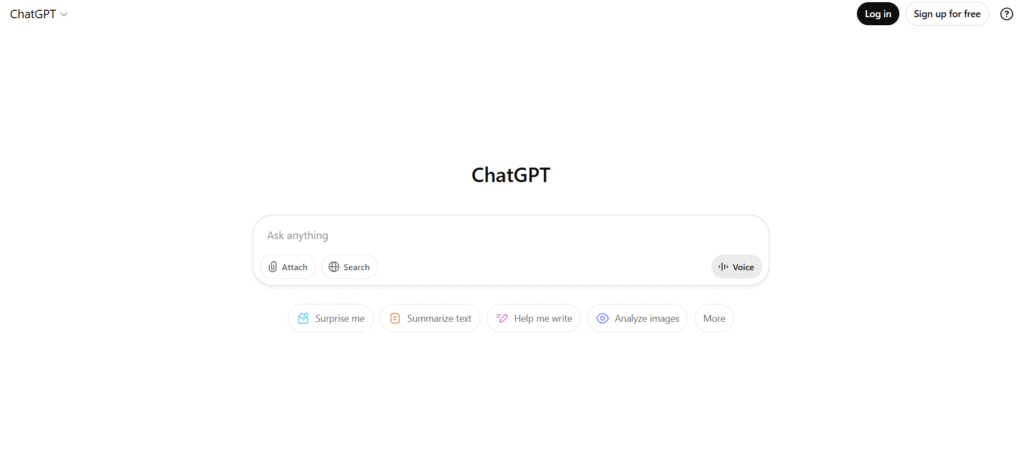
How to Use ChatGPT for Keyword Research
ChatGPT is an advanced language model that can help you brainstorm ideas for keyword research in a matter of minutes.
Here’s how you can leverage ChatGPT for keyword research:
- Generate Keyword Ideas: Ask ChatGPT to suggest relevant keywords based on your niche. For example, “What are the top keywords for a website that sells eco-friendly products?”
- Expand Long-Tail Keywords: ChatGPT can help generate long-tail keywords by taking broad topics and expanding them into specific search queries that your target audience might be searching for. For example, if you’re targeting “fitness,” you can ask ChatGPT to expand it into specific exercises, routines, and health tips.
- Find Related Terms: ChatGPT can also suggest related terms based on context. So if you have a keyword like “handmade jewelry,” ChatGPT might suggest related keywords like “custom jewelry,” “artisan rings,” or “personalized gifts.”
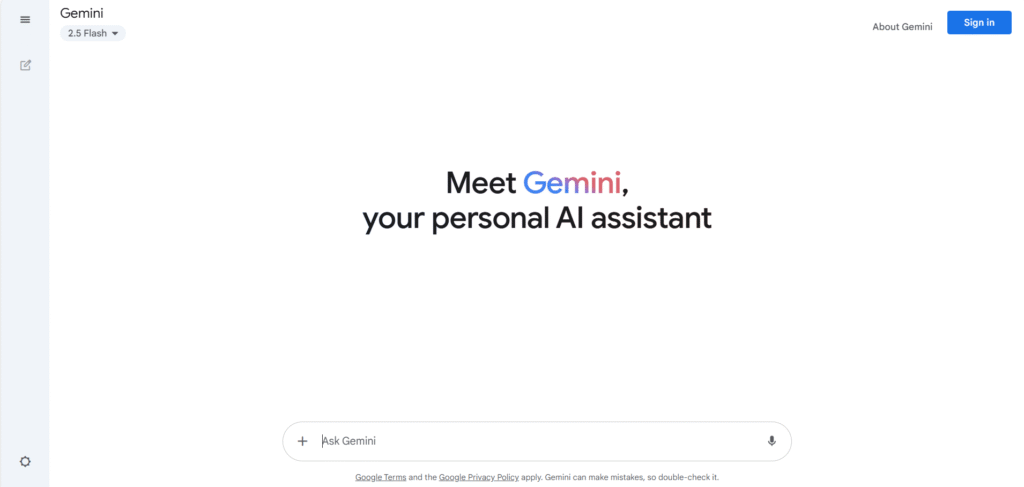
How to Use Gemini for Keyword Research
Gemini, another powerful AI tool, is known for analyzing large datasets quickly and accurately.
To use Gemini for keyword research:
- Track Trending Keywords: Use Gemini to identify rising trends in your industry. This tool uses real-time data to identify emerging keywords that can help you create content that ranks sooner.
- Semantic Analysis: Gemini can assist with semantic keyword analysis, helping you find words and phrases that are conceptually related to your target keywords.
- Competitor Insights: You can use Gemini to analyze what keywords your competitors are ranking for and find keyword gaps that you can capitalize on.
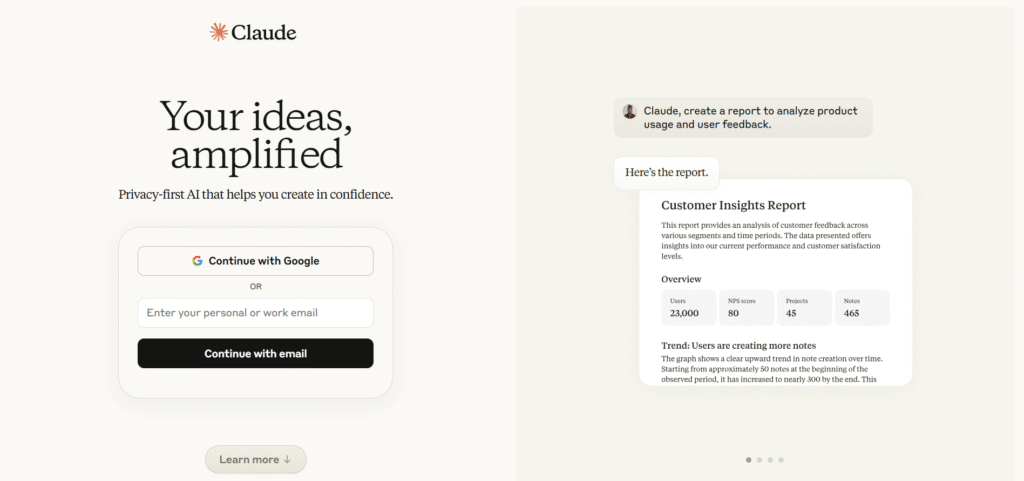
Claude, a competitor of ChatGPT, is another LLM (Large Language Model) designed to analyze and predict keyword trends.
How to Use Claude for Keyword Research
Here’s how Claude can help you in your keyword research process:
- Generate Long-Tail Keywords: Ask Claude to generate long-tail keyword suggestions based on your broad keyword. For example, you can ask Claude, “What are the best long-tail keywords for selling handmade jewelry online?”
- Analyze Search Intent: Claude helps analyze keywords by search intent—ensuring you’re targeting keywords that are aligned with what people want, whether they are ready to buy or just seeking information.
- Content Optimization: Claude can assist in structuring your content to target multiple relevant keywords by analyzing the search data and suggesting the most effective content strategy.
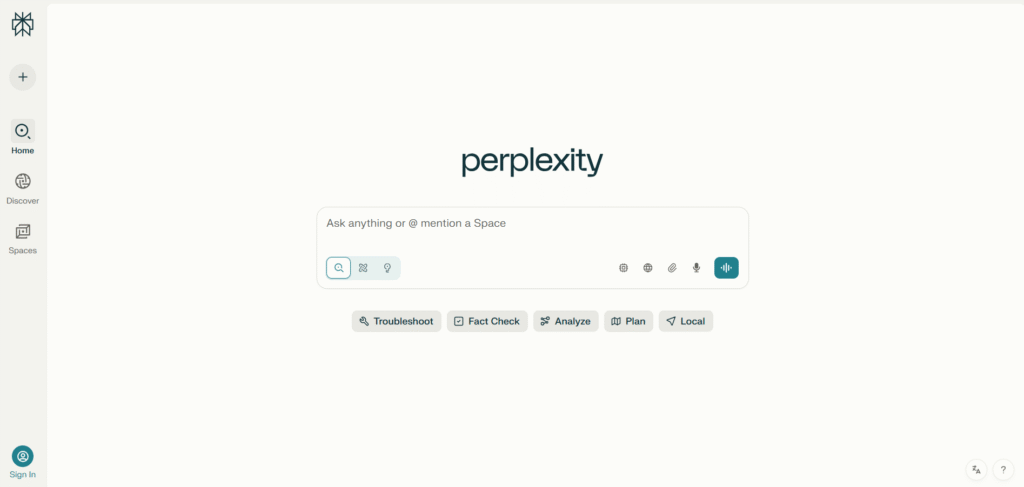
How to Use Perplexity for Keyword Research
Perplexity uses machine learning to predict the next words based on context and search behavior.
Here’s how you can use Perplexity for keyword research:
- Keyword Generation: Input your main topic, and Perplexity will generate related semantic keywords. For example, “SEO tips” could generate keywords like “SEO ranking tips,” “improve website SEO,” and “SEO keyword strategies.”
- Finding Questions: Perplexity is excellent at helping you find question-based keywords. You can ask it for the top questions people are asking about a specific topic, like “How to improve SEO for a blog?” and it will provide keyword suggestions based on user queries.
- Predict Future Keywords: One of Perplexity’s standout features is its ability to predict which keywords are gaining traction. This can help you target new and emerging keywords before they hit peak volume.
Use Cases of Using AI For Keyword Research 💼
AI in keyword research isn’t just about generating keyword ideas—it’s about empowering your content strategy.
Here are some specific use cases for AI-powered keyword research:
- Generating Keyword Ideas at Scale: Tools like ChatGPT, Perplexity, and Claude can generate an endless list of keyword ideas based on your niche and audience. For example, if you’re a blogger in the tech space, these tools can generate keyword lists about new technologies, software reviews, and tech tutorials.
- Identifying Keyword Gaps: AI allows you to analyze your competitors and see which keywords they’re ranking for. Tools like Ahrefs and SEMrush let you spy on your competitors and identify keyword gaps—terms they haven’t targeted yet, giving you a chance to fill that void and rank first.
- Finding Semantic Keywords: AI tools like Claude and Perplexity help you identify semantically related keywords. This helps you optimize for multiple terms with a single piece of content. So, you’re not just going after “SEO,” but also targeting words like “search engine optimization,” “content marketing,” and “keyword research tools.”
- Automating Search Intent Analysis: Instead of manually analyzing the search intent of every keyword, AI tools can automatically categorize keywords by their intent (informational, transactional, navigational). This helps you create content specifically tailored to user needs, whether it’s a blog post or a product page.
- Keyword Trend Forecasting: AI tools analyze historical data to predict emerging keywords. This allows you to create content ahead of the competition and target trending topics before they become saturated.
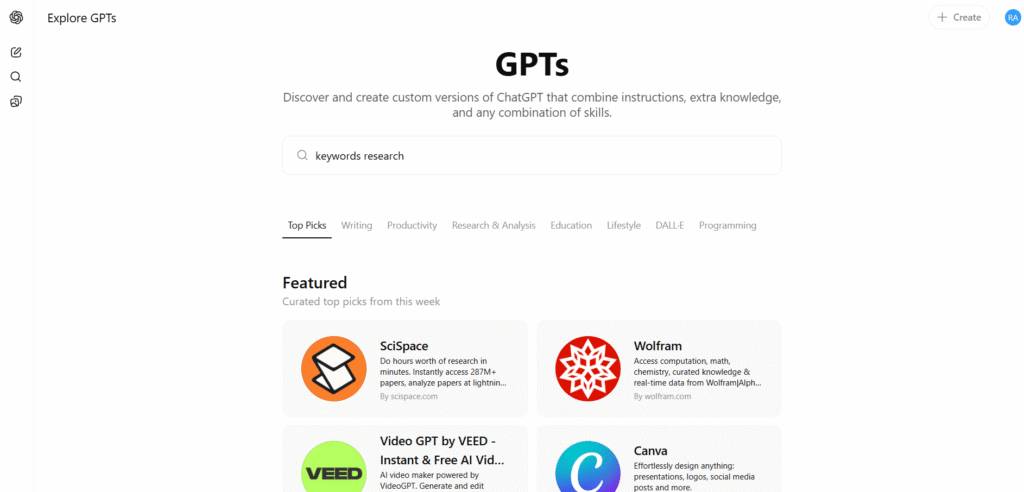
ChatGPT Plugins for Keyword Research
As if ChatGPT wasn’t already mind-blowing, it now offers plugins that can take your keyword research game to a whole new level.
These plugins tap into external data sources and powerful features that allow you to supercharge your research, making it faster, more accurate, and deeply insightful.
In this section, we’ll explore the best ChatGPT plugins for keyword research, how they work, and how to integrate them into your SEO strategy. Let’s dive in.
1. SEMrush Plugin for Keyword Research
SEMrush is a well-known powerhouse in the SEO world, and its ChatGPT plugin makes it even easier to access its keyword research tools.
By integrating SEMrush with ChatGPT, you get a direct line to one of the most trusted keyword research platforms without having to leave the ChatGPT interface.
How it works:
- Use the plugin to search for keywords, check their search volume, and assess competition directly within the ChatGPT window.
- You can also track keyword rankings over time, find related keywords, and even see which competitors are ranking for the same terms.
Why it’s great:
SEMrush is known for providing highly detailed keyword data, and using it through ChatGPT allows you to get actionable insights in real-time without having to manually navigate SEMrush’s website.
Plus, you can ask ChatGPT follow-up questions based on the keyword data, making it a much more conversational and streamlined experience.
2. Ahrefs Plugin for Keyword Discovery
If you’re serious about SEO, then Ahrefs is likely already on your radar.
The Ahrefs plugin for ChatGPT makes it easier than ever to dive into keyword research without switching between platforms.
How it works:
- You can ask ChatGPT to run keyword analyses using Ahrefs, which will return data on keyword volume, difficulty, and click potential.
- The plugin also helps uncover long-tail keywords, show the ranking history of specific keywords, and suggest related terms you might not have thought about.
Why it’s great:
Ahrefs is known for its backlink analysis and keyword difficulty scores, which helps you focus on keywords that offer the best chance of ranking.
With the plugin, you get all these features directly in your conversation with ChatGPT, which means you don’t have to toggle between tabs or tools.
3. Frase Plugin for Content and Keyword Insights
If you’re looking for a content-focused keyword strategy, the Frase plugin is your best friend.
Frase’s AI helps you find the most relevant keywords for your niche while also giving you content suggestions to rank for those keywords.
How it works:
- ChatGPT, powered by the Frase plugin, can instantly generate keyword suggestions based on the latest search trends, your niche, and even your competitors.
- Frase’s AI also provides keyword topic clusters, so you can create a well-rounded content strategy around the most effective keywords for your website.
Why it’s great:
Frase doesn’t just help you find keywords—it also suggests the best content topics to pair with those keywords. This makes it an ideal plugin for both keyword discovery and content planning.
4. Keyword Tool Plugin for Long-Tail Keywords
If you’re all about targeting long-tail keywords, the Keyword Tool plugin for ChatGPT will be a game-changer.
This plugin helps you focus on highly specific, low-competition keywords that your competitors might be missing.
How it works:
- Simply provide a broad keyword, and the Keyword Tool plugin will generate a list of long-tail variations and their associated search volumes.
- It also shows you related question-based keywords that users frequently ask about, giving you great opportunities for blog content.
Why it’s great:
Long-tail keywords have lower competition and often show higher conversion intent, making them a goldmine for organic traffic.
The Keyword Tool plugin simplifies the process by generating these high-value keywords at scale, saving you tons of time.
5. Moz Plugin for Keyword Difficulty and Link Analysis
Moz is another trusted name in SEO, and its plugin for ChatGPT takes keyword research a step further by adding link analysis into the mix.
How it works:
- You can use the Moz plugin to analyze the keyword difficulty for various terms, helping you decide which keywords are worth pursuing.
- The plugin also provides insights into backlink opportunities, so you can start building authority for the keywords you’re targeting.
Why it’s great:
Moz’s keyword difficulty scores are incredibly helpful when choosing between different keywords.
And by incorporating link analysis, it lets you build a solid strategy that combines both content and backlinks for maximum ranking power.
6. Google Keyword Planner Plugin for Search Volume Insights
Google Keyword Planner is the go-to tool for search volume data, and now, with the plugin for ChatGPT, you can access this critical data right within your conversation.
How it works:
- Enter a keyword, and ChatGPT will pull search volume data from Google Keyword Planner, giving you a snapshot of how many people are searching for that term each month.
- You can also get location-based insights (e.g., how often people search for a keyword in the UK, US, or other regions), which can be particularly useful if you’re targeting specific geographic markets.
Why it’s great:
Google Keyword Planner is one of the most accurate sources of search volume data, and having it built into ChatGPT makes it easy to instantly access this crucial information without hopping between tabs.
How to Get Started with ChatGPT Plugins for Keyword Research
Getting started with ChatGPT plugins for keyword research is straightforward:
- Choose Your Plugin: Depending on your needs, choose the plugin that best suits your goal—whether it’s keyword volume analysis, long-tail keyword discovery, or competitive keyword analysis.
- Ask ChatGPT Questions: Once the plugin is activated, simply ask ChatGPT specific questions. For example, you could ask:
- “What are the best long-tail keywords for my handmade jewelry business?”
- “Can you provide search volume data for the keyword ‘eco-friendly products’ using Google Keyword Planner?”
- Analyze and Filter: Once you have the data, ChatGPT can help you analyze it. Ask follow-up questions like, “What’s the competition level for this keyword?” or “Can you group these keywords into clusters?”
- Refine Your Strategy: Use the insights gained from the plugins to refine your keyword strategy, build relevant content, and implement a competitive SEO plan.
Why ChatGPT Plugins Are a Game-Changer for SEO
Connecting ChatGPT plugins with renowned SEO tools such as SEMrush, Moz, Ahrefs, and Google Keyword Planner has changed the way how we perform keyword research with ChatGPT.
Funnel together the power of AI-driven conversations and instant data from vetted platforms while also taking away precious time from you, to provide you with hyper-precise keyword insights.
When doing a keyword search using ChatGPT and taking this format you get more than just a bunch of keywords but a personal SEO assistant that can help you with the keyword strategy using the right metrics, track trends, analyze competition and get you the content that would rank.
It is like having an expert SEO working round the clock for you, without you paying through your nose.
ChatGPT Prompts for SEO Keywords
Integrating ChatGPT into keyword research workflows significantly accelerates idea generation.
However, effectiveness depends entirely on prompt quality.
This section provides actionable templates and integration strategies to transform ChatGPT from a novelty into a core research tool.
Why Prompts Matter: Precision Over Guesswork
ChatGPT operates like a highly intelligent but context-blind assistant.
Vague prompts yield generic results. Specific prompts incorporating location, intent, and constraints produce commercially viable keywords. For example:
- Weak Prompt: “Give keywords about gardening” → Returns broad, low-value terms
- Strong Prompt: “Generate 20 commercial-intent long-tail keywords for organic vegetable seeds targeting UK gardeners” → Yields actionable, region-specific phrases
Effective Prompt Templates for Keyword Discovery
Use these tiered templates for consistent results:
- Foundation Builder:
“Generate [number] long-tail keywords related to [topic/product] for [location]. Focus on [informational/commercial/transactional] intent. Exclude keywords containing [irrelevant terms].”
Example Output for “yoga mats uk”: “non-slip yoga mats uk”, “eco-friendly cork yoga mat uk”, “thick yoga mat for knee pain uk” - Competitor Gap Analysis:
“Identify keyword gaps between [Your Brand] and [Competitor Brand] in the [industry] sector for [location]. List 15 keywords with commercial intent they rank for but we don’t.” - Semantic Expansion:
“Provide semantic variations and related questions for [primary keyword] in [location]. Group by user intent. Include local terminology.”
Example for “rain jackets london”: “waterproof macs london”, “best raincoat for tube commute”, “lightweight shower proof jacket uk”
Sample Prompt Templates
| Use Case | Example Prompt |
|---|---|
| Topic Exploration | “Generate 30 informational keywords about sustainable gardening for UK beginners. Exclude product names. Group by subtopic.” |
| Competitor Research | “Suggest commercial-intent keywords that [Competitor Brand] ranks for in UK searches related to wireless headphones. Focus on purchase-ready terms.” |
| Content Expansion | “Provide semantic variations and related questions for ‘vegan protein powder UK’. Include comparison queries and local slang.” |
Integrating ChatGPT into Your SEO Workflow
Follow this four-step integration framework:
- Ideation Phase:
Use Foundation Builder prompts to create initial keyword lists for new content projects. - Content Planning:
Feed primary keywords into Semantic Expansion prompts to build topic clusters. - Competitor Benchmarking:
Run Competitor Gap Analysis prompts monthly to identify new opportunities. - Updating Legacy Content:
Input existing page URLs/content into ChatGPT with: “Suggest 10 refresh opportunities for [URL] targeting missing commercial keywords in [location].”
Common Pitfalls and How to Avoid Them
- Hallucinated Keywords: ChatGPT invents plausible but non-existent phrases. Solution: Always verify search volume.
- Intent Misclassification: AI frequently mislabels informational queries as commercial. Solution: Manually check SERPs.
- Localization Gaps: May miss regional slang (e.g., “pram” vs. “stroller”). Solution: Include local terms in prompts.
Verification: The Non-Negotiable Step
Never deploy ChatGPT-generated keywords without validation. Essential checks:
- Paste keywords into Google Keyword Planner or Semrush for volume/difficulty data
- Manually review top 10 SERPs for intent accuracy
- Cross-reference with Google Trends for seasonality/local interest
This process transforms ChatGPT from an idea generator into a validated research accelerator, cutting keyword discovery time by 50-70% while maintaining strategic rigor.
AI Prompts For Keyword Research 🧠
If you’re using an AI tool like ChatGPT, Claude, or Perplexity, you can optimize your prompts to get the best keyword suggestions.
Here are a few AI prompts to guide your keyword research:
- “Give me a list of long-tail keywords related to [your niche].”
- “Identify related semantic keywords for [primary keyword].”
- “What are the top emerging keywords in [your industry]?”
- “Suggest low-competition keywords for [business niche] with high potential for ranking.”
- “List questions people are asking about [specific topic].”
These prompts help AI tools focus on specific aspects of keyword research, so you can get more tailored, high-value suggestions.
Best Tools For AI-Powered Keyword Research 🏆
To make keyword research easier, you’ll want to choose tools that utilize AI to help you gather insights quickly.
Here are some of the best tools:
- Frase: Known for its AI-driven content research and keyword discovery features, Frase helps you uncover high-value keywords and group them into clusters based on search intent. It also integrates with GPT-powered tools like ChatGPT to provide more comprehensive insights.
- SurferSEO: This AI tool is excellent for keyword clustering and content optimization. It helps you target multiple keywords within a single piece of content by clustering related keywords.
- SEMrush: A popular tool that uses AI to analyze keywords, assess competition, and track ranking. It also allows you to monitor keyword performance and adjust strategies based on real-time data.
- Ahrefs: Great for competitor analysis and keyword discovery. Ahrefs gives you the ability to track keywords across multiple countries, analyze search intent, and spy on competitors.
- ChatGPT: While not primarily a keyword research tool, ChatGPT can generate keyword ideas, long-tail suggestions, and answer questions about user intent. It’s like having an SEO consultant available 24/7.
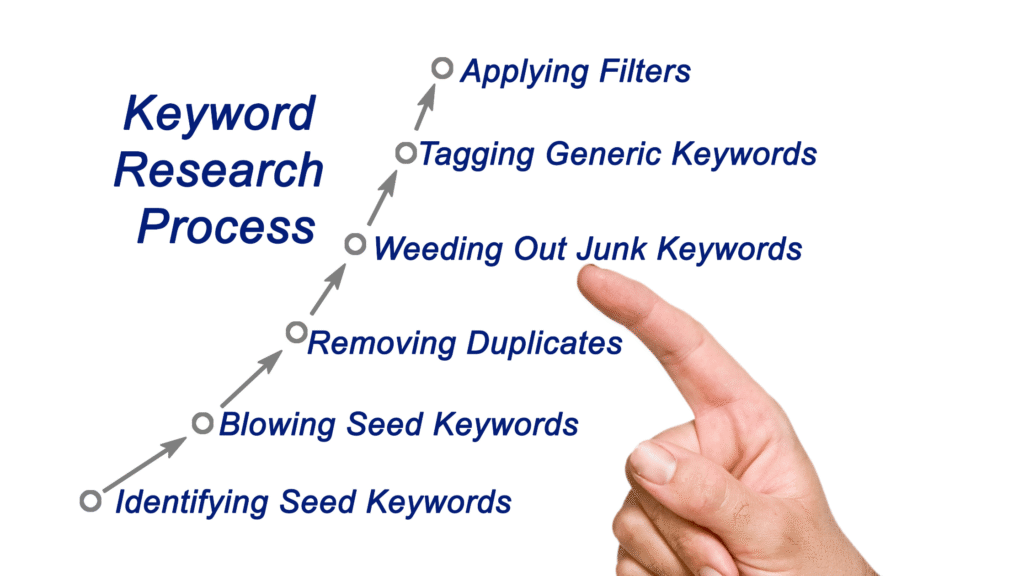
At the end of the day, AI is your keyword research superhero. 🚀 It’s efficient, fast, and smart—everything you need to crush it in SEO.
And hey, don’t forget to drop a comment below if you’re using AI in your strategy or if you’ve got any burning questions! I’d love to hear what’s working for you.
Questions & Answers
Q:What is AI keyword research and why is it important for SEO?
A:AI keyword research uses machine learning algorithms to scan massive amounts of search data, identify trends, predict user behavior, and pinpoint the most relevant and profitable keywords for your business. It’s crucial for SEO because it helps you uncover valuable keywords, understand search intent, automate repetitive tasks, and ultimately achieve better rankings and increased organic traffic.
Q:Can AI truly perform keyword research more effectively than traditional methods?
A:Yes, AI can perform keyword research better, faster, and smarter. It analyzes large datasets instantly, identifies trends before they’re widely known, predicts user behavior, and provides data-backed suggestions that are often more accurate and efficient than manual methods. AI-powered tools like SEMrush, Ahrefs, and Frase can scrape volumes, competition data, and search intent with high efficiency.
Q:What are the key benefits of using AI for keyword research?
A:The main benefits include discovering hidden, low-competition keywords, performing better search intent analysis, efficiently grouping related keywords into clusters, providing predictive insights into rising trends, and automating time-consuming tasks. This helps you optimize content for multiple terms and stay ahead of the competition.
Q:What are some of the best AI-powered tools for keyword research, including free options?
A:Top AI-powered tools include Frase, SurferSEO, SEMrush, and Ahrefs. For free options, Google Keyword Planner, Ubersuggest, Answer the Public, and Google Trends are excellent choices. Some AI tools like Frase and SurferSEO also offer free trials to experience their AI capabilities.
Q:How do I implement AI into my existing keyword research strategy?
A:Start by choosing an AI-powered tool and entering seed keywords related to your niche. Let the AI expand your list with related and long-tail variations. Then, analyze search intent and keyword difficulty with AI assistance. Finally, organize keywords into clusters for content planning and create high-quality content based on these insights.
Q:How can I use large language models like ChatGPT, Gemini, and Claude for keyword research?
A:These AI tools can generate keyword ideas, expand long-tail keywords from broad topics, find related terms, assist with semantic analysis, track trending keywords, and analyze search intent. They are great for brainstorming and getting context-aware suggestions for your content strategy.
Q:What are ChatGPT plugins for keyword research and which ones are recommended?
A:ChatGPT plugins extend its capabilities by integrating with external data sources and SEO tools. Recommended plugins for keyword research include SEMrush, Ahrefs, Frase, Keyword Tool, Moz, and Google Keyword Planner. These plugins allow you to access detailed keyword data, difficulty scores, search volumes, and competitive insights directly within the ChatGPT interface.



